- Election 2024
- Entertainment
- Newsletters
- Photography
- Personal Finance
- AP Investigations
- AP Buyline Personal Finance
- AP Buyline Shopping
- Press Releases
- Israel-Hamas War
- Russia-Ukraine War
- Global elections
- Asia Pacific
- Latin America
- Middle East
- Election Results
- Delegate Tracker
- AP & Elections
- Auto Racing
- 2024 Paris Olympic Games
- Movie reviews
- Book reviews
- Personal finance
- Financial Markets
- Business Highlights
- Financial wellness
- Artificial Intelligence
- Social Media

Australian and Chinese leaders talk pandas and wine as ties improve despite disagreements
Australia’s Prime Minister Anthony Albanese, left, gestures as he meets with China’s President Xi Jinping at the Great Hall of the People in Beijing, China, Monday, Nov. 6, 2023. Albanese is on a three-day visit to China. (Lukas Coch/AAP Image via AP)
Australia’s Prime Minister Anthony Albanese, left, meets with China’s President Xi Jinping at the Great Hall of the People in Beijing, China, Monday, Nov. 6, 2023. Albanese is on a three-day visit to China. (Lukas Coch/AAP Image via AP)
Australia’s Prime Minister Anthony Albanese visits the Temple of Heaven in Beijing, China, Monday, Nov. 6, 2023. Albanese has struck an optimistic tone ahead of his meeting with Chinese leader Xi Jinping, calling for cooperation while emphasizing that the two countries will continue to have differences (Lukas Coch/AAP Image via AP)
In this photo released by Xinhua News Agency, Australian Prime Minister Anthony Albanese delivers his speech at the opening ceremony of 6th China International Import Expo (CIIE) and the Hongqiao International Economic Forum in Shanghai on Sunday, Nov. 5, 2023. Albanese struck an optimistic tone ahead of his meeting with Chinese leader Xi Jinping on Monday, Nov. 6 calling for cooperation while emphasizing that the two countries will continue to have differences. (Jin Liwang/Xinhua via AP)
China’s Premier Li Qiang, left, greets Australia’s Prime Minister Anthony Albanese during the China International Import Expo opening session in Shanghai, China, Sunday, Nov. 5, 2023. Albanese will hold talks in China with President Xi Jinping in the first visit to the Asian nation by a sitting prime minister since 2016. (Lukas Coch/AAP Image via AP)
- Copy Link copied
BEIJING (AP) — The leaders of Australia and China joked about the relative cuteness of pandas and Tasmanian devils on Monday in a largely symbolic meeting that reflected the ongoing upswing in relations between the two countries after several years of acrimony and division.
Prime Minister Anthony Albanese is making the first visit by an Australian leader to China in seven years in a sign of both how low relations fell and how they have begun to stabilize.
He and Chinese President Xi Jinping welcomed the gradual improvement in ties in the past year and emphasized the importance of engaging with each other despite differences on issues such as defense.
China, a major market for Australia, has lifted some trade restrictions on Australian products since the two leaders first met in Bali, Indonesia, in November 2022.
“The progress we have made in advancing our relationship over that time has been unquestionably very positive,” Albanese said in opening remarks to Xi before the media. “Trade is flowing more freely to the benefit of both countries.”
Xi said that both sides had resumed exchanges of views and worked out some problems.
“The China-Australia relationship has embarked on the right path of improvement and development,” Xi said. “I’m heartened to see that.”
Albanese said he would meet Chinese Premier Li Qiang on Tuesday before returning to Australia.
Relations nosedived in recent years as suspicions of Chinese interference in Australian politics increased. China, in turn, was angered by Australia’s call for an inquiry into the origins of the COVID-19 virus.
China levied tariffs and unofficial trade barriers that are estimated to have cost Australian exporters up to 20 billion Australian dollars ($13 billion) a year for products such as coal, wine, beef, barley and lobsters.
Those barriers have since been substantially reduced and now cost about $2 billion Australian dollars ($1.3 billion). China has signaled that it is moving toward lifting punishing tariffs on Australian wine that dealt a severe setback to the industry.
“We even had a bit of a debate about wine and the quality,” Albanese told reporters. He said that Xi had said during their meeting that he had visited New Zealand and been told how good the wines are there. “I asserted Australia’s pre-eminence when it comes to quality red wine,” Albanese said.
Xi also talked about his visits to Australia, and described Tasmanian devils as cute, the Australian leader said. When Albanese said that they probably weren’t as cute as pandas, Xi replied that not all pandas were cute, citing the Kung Fu Panda movie.
“That shows really just how warm the exchange was,” Albanese said.
When asked by a journalist, Albanese confirmed that he had raised the case of Yang Hengjun , an Australian democracy blogger who has been detained in China for almost five years, but didn’t say how Xi responded.
China did release Australian journalist Cheng Lei last month after three years in detention under charges of espionage , a case that had come to be a focal point in the tensions.
Even as Albanese has largely sounded upbeat during his visit, Australia is still actively pursuing a security partnership with the United Kingdom and the United States that China views as an attempt to counter its influence in the region.
The Australian leader, in his opening remarks to Xi, underscored the importance of high-level dialogue and people-to-people links.
“Where differences arise, it’s important that we have communication,” Albanese said. “From communication comes understanding.”
Before coming to Beijing, Albanese was a guest at the opening ceremony of an annual import expo in Shanghai on Sunday at which Chinese Premier Li Qiang pledged to further relax market access.
Albanese’s visit comes around the 50th anniversary of the first trip by an Australian prime minister to the People’s Republic of China.
“Your visit this time is highly significant, as it builds on the past and ushers in the future,” Xi told Albanese.
Albanese noted the 1973 visit of former Prime Minister Gough Whitlam in a post on X, formerly Twitter, that included photos of the current leader and his entourage visiting the Temple of Heaven historic site.
“Since he visited the Temple of Heaven in Beijing, much has changed,” Albanese wrote. “But what is constant is that engagement between our two countries remains important.”
Wu reported from Bangkok.
Australia’s Albanese heads to China touting ‘consistent, steady’ engagement
Labor leader is first Australian prime minister to visit since 2016 after a turbulent period in bilateral ties.
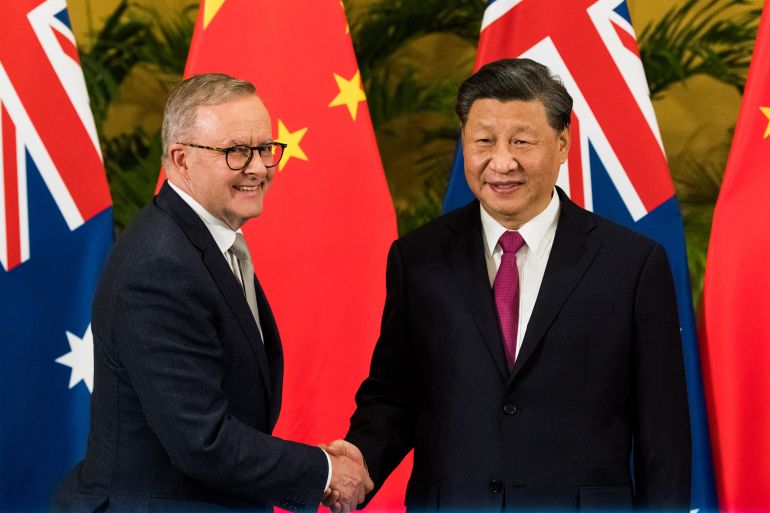
Australian Prime Minister Anthony Albanese will travel to Beijing on Saturday, a little over 50 years since his predecessor Gough Whitlam’s historic journey to China.
But while Albanese may be following in the steps of Whitlam , who forged ties with China in 1972, he was careful first to travel to the United States, Australia’s so-called “forever friend”.
Keep reading
Uk awards $4bn contract to build aukus nuclear submarines uk awards $4bn contract to build aukus ..., australia rejects constitutional reform to recognise indigenous people australia rejects constitutional reform ..., australia declines to cancel chinese lease of port after security review australia declines to cancel chinese ....
Albanese confirmed the exact dates of his long-planned China visit – November 4 to 7 – just hours before he got on the plane to Washington, DC, and also announced some policy initiatives – including for Australian wine growers – indicating a potential thawing of Australia’s relationship with Beijing.
“Consistent, steady engagement with our international partners gets results for Australia,” the prime minister wrote on X last week.
At the White House, Albanese and his partner enjoyed a lavish state dinner, amid Canberra’s deepening security ties with the US, and initiatives such as the Quad and the AUKUS nuclear submarine deal that have caused upset in Beijing.
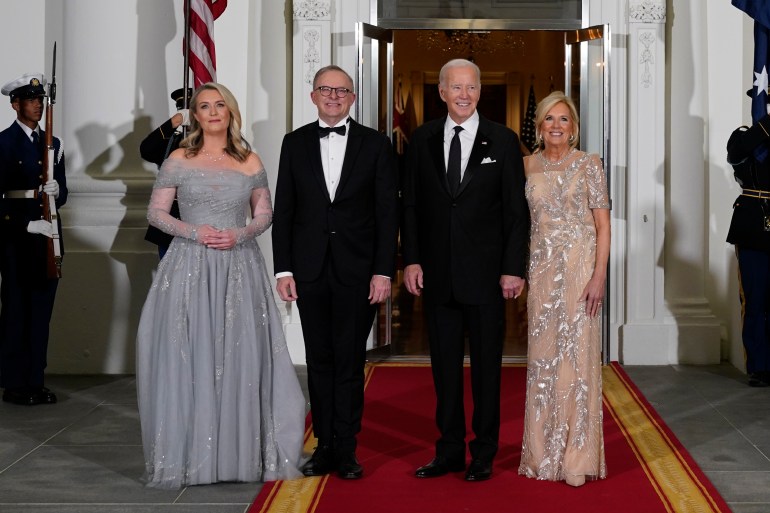
Emma Shortis, a senior researcher in International and Security Affairs at the Australia Institute told Al Jazeera that Albanese’s government was “very clearly … doubling down on the US alliance” while also being “intent” on “stabilising the relationship with China and particularly the trade relationship.”
China is Australia’s largest trading partner.
“That’s an incredibly difficult line to walk and I think we’ll just need to wait and see how they handle it,” Shortis said.
Albanese’s China visit – the first by an Australian leader in seven years – comes after a bridge-building trip by Foreign Minister Penny Wong in December 2022.
One group that will be banking on his diplomatic skills will be Australian wine growers.
Matthew Rimmer, Professor of Intellectual Property and Innovation Law, at the Queensland University of Technology, noted that with the dispute over wine tariffs now suspended at the World Trade Organization, there was a chance of progress.
“Perhaps this dispute can be resolved altogether during the visit,” he told Al Jazeera.
China was once the biggest buyer of Australian wine and Beijing’s imposition of duties in 2020 has left vineyards with a massive oversupply.
But Rimmer notes, trade negotiations will not be clear-cut given the complexity of the two countries’ relationship.
Australian intelligence agencies have raised “concerns that China has been targeting the confidential information and trade secrets of Australian research institutions,” he said. “No doubt intellectual property and trade will be a touchy subject.”
‘Starting point’
Albanese came to power in 2022 amid hopes for a reset of Chinese relations, which under the conservative government of predecessor Scott Morrison had deteriorated over a range of issues from trade disputes, to COVID-19, accusations of political interference and spying, as well as human rights.
The return of Australian journalist Cheng Lei to Australia earlier this month after three years in Chinese detention has helped raise hopes for a potential thawing of the bilateral relationship.
Still, Kevin Yam, a Hong Kong lawyer and democracy activist now living in Australia, told Al Jazeera while Albanese’s visit could be a good “starting point”, it is also important for Albanese to “raise things and push for things that need to be pushed for”.
Yam is one of the eight Hong Kong exiles “wanted” by Hong Kong police after Beijing imposed a National Security Law in 2020 that Amnesty has said has “decimated” the territory’s freedoms.
He points out there are also two other Australians – democracy blogger Yang Hengjun and Hong Kong democracy activist Gordon Ng – whose cases “should be vigorously raised at any meetings with the Chinese authorities”.
On Wednesday, Albanese confirmed he would use his visit to raise the case of Yang, who has been detained in China since 2019.
Yam hopes the Australian leader will also raise the case of Ng, a democracy activist from Sydney “languishing in a Hong Kong jail for his role in the democracy movement in Hong Kong”.
Speaking in relation to Hong Kong specifically, Yam noted that 100,000 Australians are living in the Chinese territory, meaning that it was in “Australia’s national interest” for the “freedoms that Hong Kong has enjoyed” to return.
Meanwhile, Albanese also quietly raised the case of one other Australian journalist languishing in prison overseas – Julian Assange – during his visit to Washington, DC.
Shortis says this was probably due to increasing pressure from supporters of Assange, including a growing number of representatives in the Australian parliament who are vocally advocating for his freedom.
Assange is currently in prison in the United Kingdom pending extradition to the US where he is wanted on criminal charges over the release of confidential military records and diplomatic cables in 2010.
“People should be asking questions about why Assange isn’t being allowed to come home when we are supposedly the United States’ best friend in the world,” said Shortis.

It is a contrast to Australia’s relationship with Beijing where Yam notes there are “a lot of differences” between the two sides.
Still, despite also having his own personal differences with the China government, Yam sees the visit to China as a “good thing” as long as Albanese raises issues beyond “trade impediments” and “[holds] firm on our bottom lines”.
Albanese will arrive in China a few weeks after Xi hosted Russian President Putin and other world leaders for the Belt and Road (BRI) forum .
While China has been “industriously pursuing the Belt and Road Initiative,” Australia has, to date, been “reluctant to join”, said Rimmer.
The Australian state of Victoria, then under the leadership of another Labor government, had signed a preliminary agreement to join the initiative in 2018, but it was vetoed by Morrison’s government amid concerns about overseas deals that were said to be “inconsistent” with Australia’s foreign policy.
The decision came at a time when ties between Beijing and Canberra were at an all-time low .
But even as Australia seeks to mend fences, it is moving carefully.
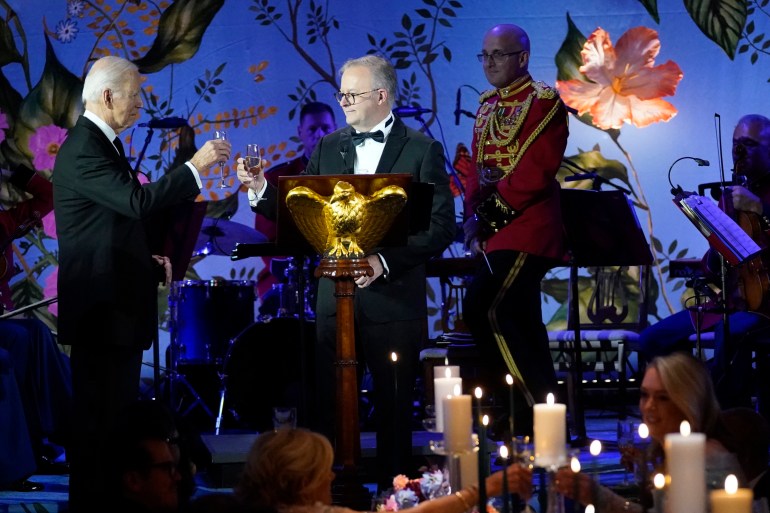
With China extending its influence in the Pacific , the Albanese government has been renewing ties with countries there.
As the BRI forum took place in Beijing, Canberra hosted Fiji’s Prime Minister Sitiveni Rabuka, while Rabuka’s deputy went to China.
Australia also took the opportunity to announce a new pathway to permanent residency for citizens of Pacific Island countries and East Timor, also known as Timor-Leste, a policy that Pacific Island countries have long been calling for amid the climate crisis.
Whitlam’s visit to China was a notable first among Western leaders.
Decades on, Albanese is seeking not to make waves but to calm the sometimes choppy seas.
- My View My View
- Following Following
- Saved Saved
China, Australia agree to turn the page as tensions ease
- Medium Text
- Xi: China, Australia should develop strategic partnership
- Both sides should build up mutual trust, Xi says
- Albanese: Strong relations 'will be beneficial into the future'
- Albanese: Recognise differences but also 'mutual benefit'
'VERY POSITIVE'
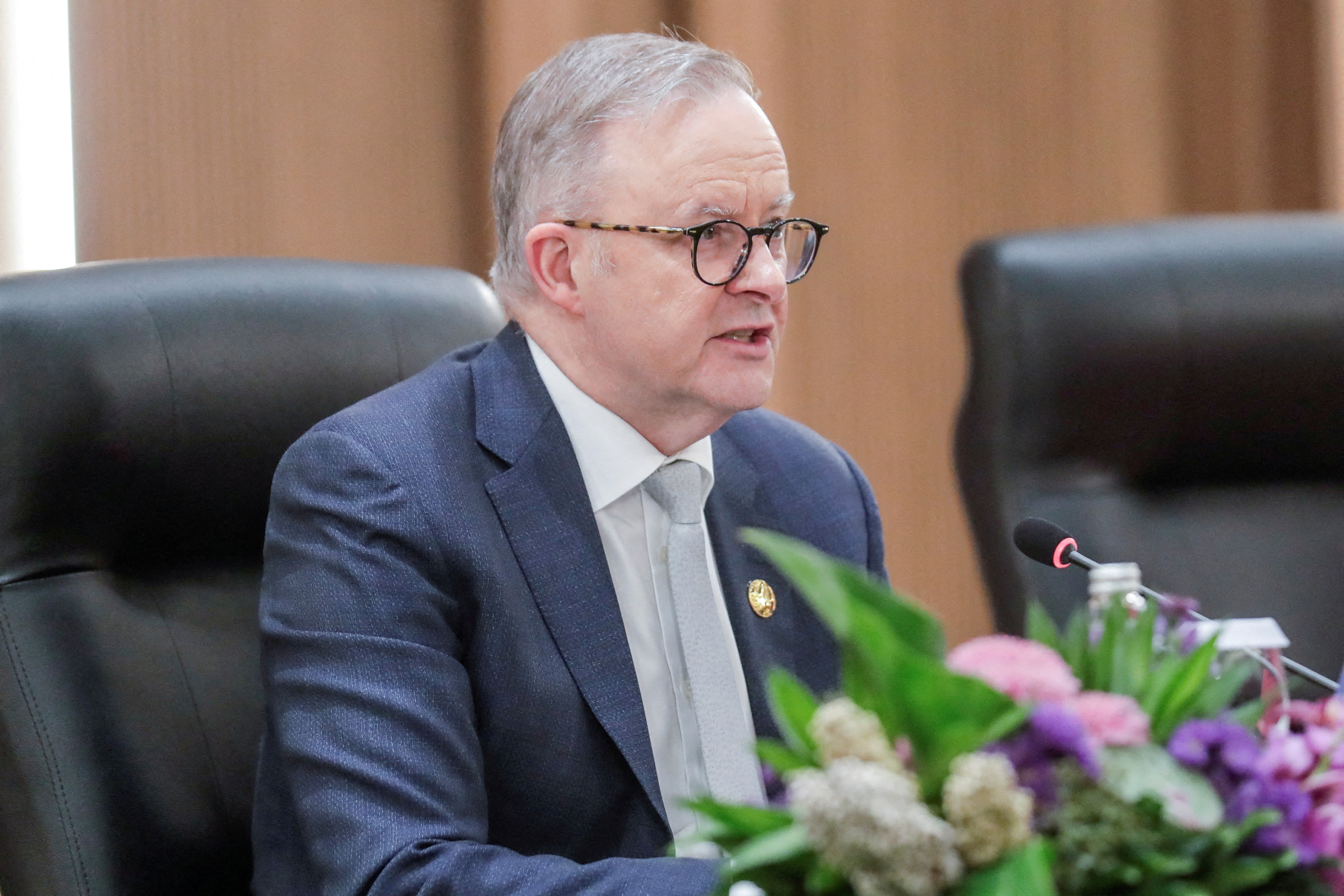
Sign up here.
Reporting by Ryan Woo; additional reporting by Kirsty Needham in Sydney; editing by Robert Birsel and Mark Heinrich
Our Standards: The Thomson Reuters Trust Principles. New Tab , opens new tab
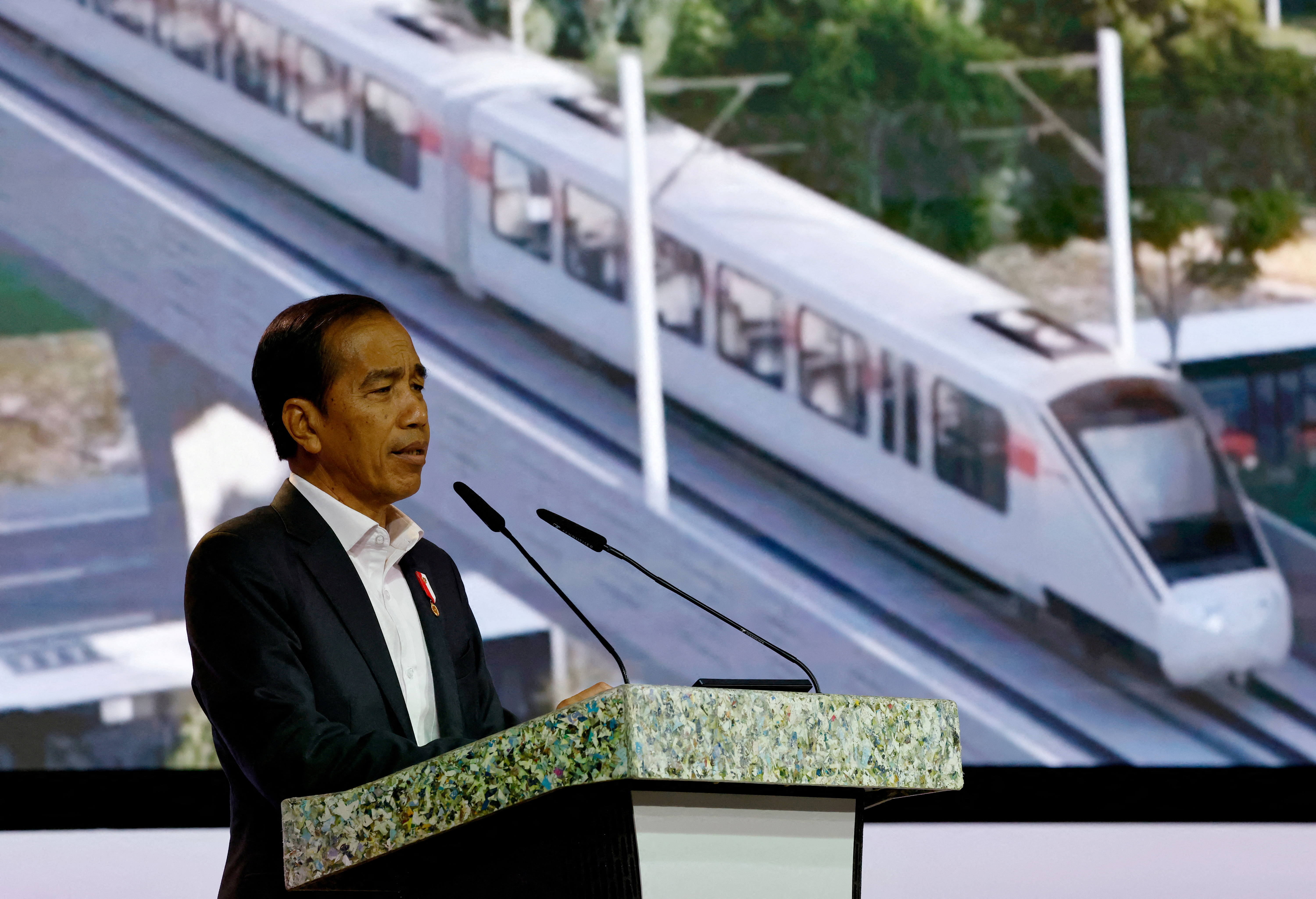
World Chevron
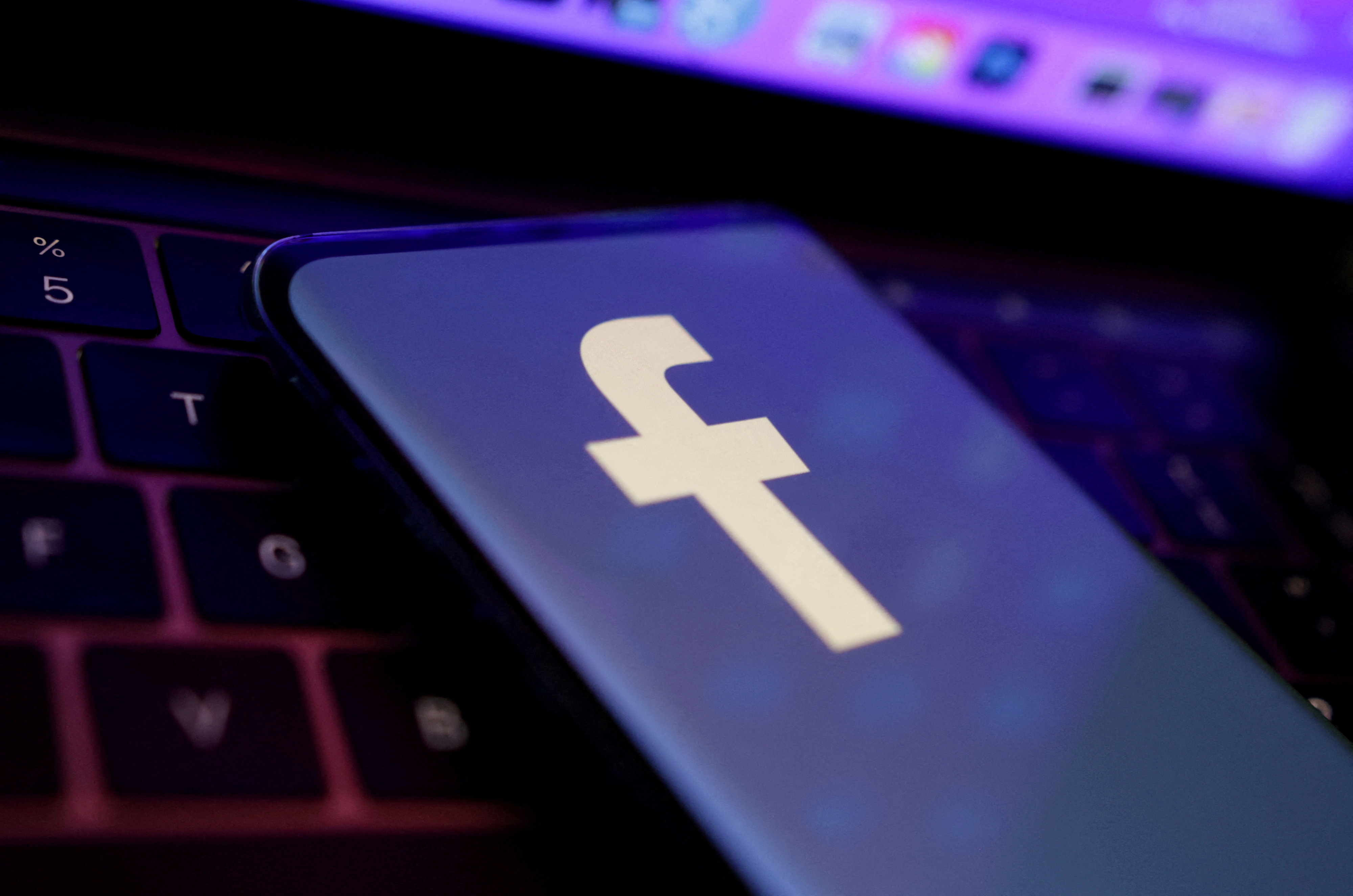
Vietnam arrests two well-known Facebook users over democratic freedom abuse
Police in Vietnam have arrested two well-known Vietnamese Facebook users on charges of abusing democratic freedoms, the government said on Saturday, as a major leadership reshuffle in the Communist-ruled country is settling down.
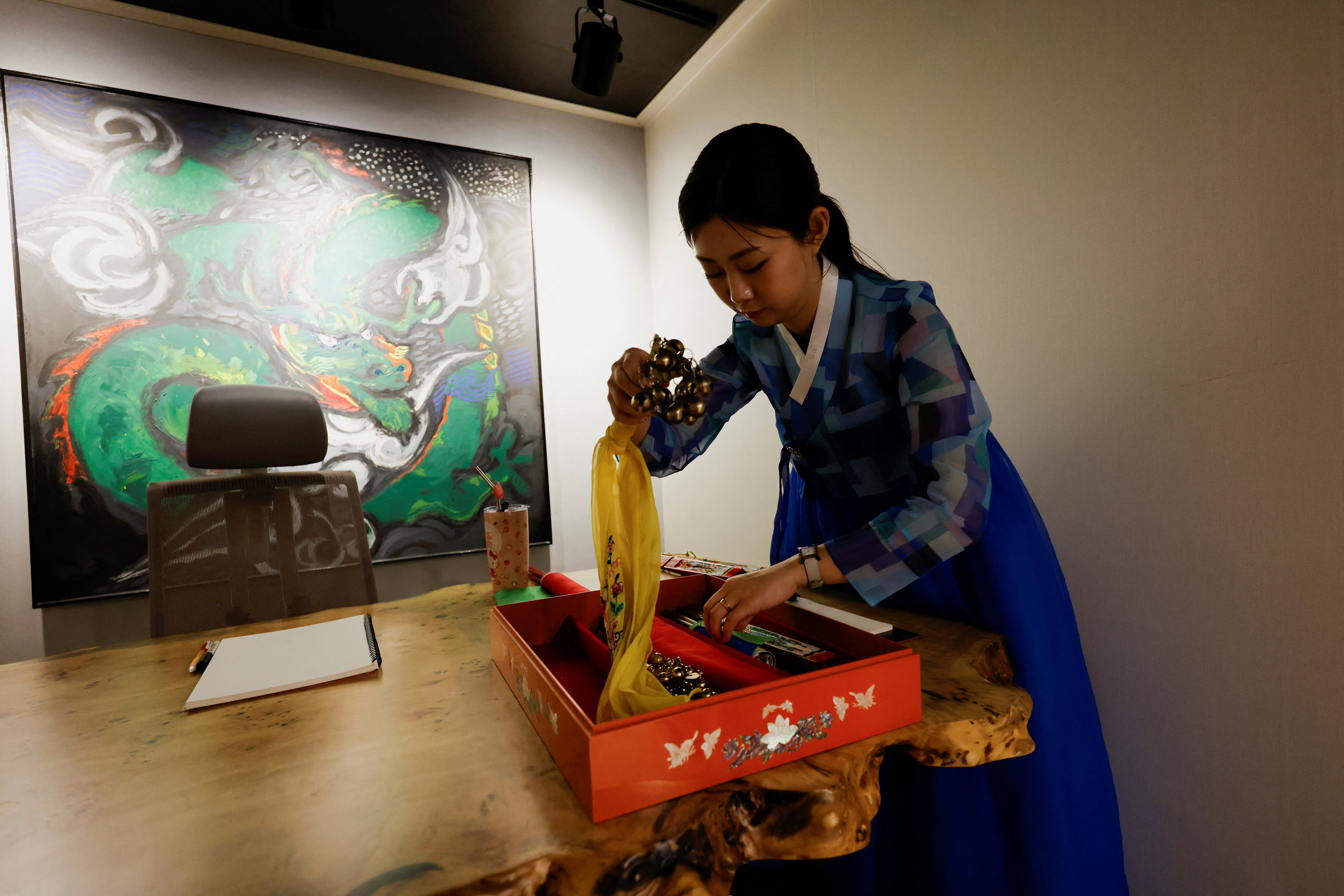
As Australian leader heads to China, a critical (minerals) issue looms

SYDNEY — When Anthony Albanese sits down with Chinese leader Xi Jinping in Beijing on Monday, the meeting will mark an achievement for the Australian prime minister, who has managed to mend once-fractured relations with his nation’s biggest trading partner without making concessions.
Looming over the event, however, will be Albanese’s previous overseas trip.
A week earlier, Albanese was in Washington, engaging in a not-so-subtle attempt to reduce his country’s reliance on China when it comes to critical minerals.
Albanese and American officials announced a raft of measures to steer Australia’s vast store of critical minerals — metallic elements and minerals crucial for clean energy technologies and some advanced weapons systems — away from being processed in China and instead sent to new plants in their own nations.
China and Australia are starting to get along. Will AUKUS torpedo it?
“China has a head start, and that means we have to work a little harder and a little faster,” U.S. Secretary of Commerce Gina Raimondo warned at an event with Albanese.
“They have the technology and sustained investment … to dominate the market for critical minerals,” she continued. “And we all know, if China were to point that new direction unfavorable to us, it can cause a great deal of pain, very quickly.”
GET CAUGHT UP Summarized stories to quickly stay informed

A punishing heat dome will test Phoenix’s strategy to reduce heat-related deaths

Trump plans to claim sweeping powers to cancel federal spending

North Korea sent trash balloons. Activists in the South sent K-pop.

U.S. notches historic upset of Pakistan at cricket World Cup

Has tipping gone too far? Here’s a guide on when to tip.
Albanese’s language was more cautious ahead of his China trip, which will begin Saturday in Shanghai and is the first by an Australian prime minister in seven years.
But Australian officials are also worried Beijing will cut off critical mineral supply chains — a move that could cripple the world’s transition to cleaner energy and undercut China’s military adversaries.
“China, with its market dominance, has restricted trade in” critical minerals in the past, Madeleine King, Australia’s minister for resources who also traveled to Washington, told The Washington Post. “So we have to have our eyes wide open about the potential for those restrictions. And if we don’t diversify, then we’ll be beholden to them in the future.”
In China, the flurry of U.S.-Australia collaboration on critical minerals is stirring fears that their military cooperation could be creeping into areas that threaten Beijing’s bottom line at a time when the Chinese economy is struggling.
“Under constant pressure from the United States, the foundation of Australia’s previous balanced policy of ‘relying on China for economy and relying on the United States for security’ has been eroded,” Yu Lei, a professor of international politics at Shandong University, told state-affiliated tabloid the Global Times.
The clash over critical minerals is just one front in an intensifying geopolitical contest between Beijing and Washington. The two superpowers increasingly have vied for influence in the Asia Pacific, where China’s growing military strength and assertiveness have spurred new American security initiatives, including a resurrected Quad and a landmark deal to provide Australia with nuclear-powered submarines.
In perhaps his most pointed move, President Biden barred sales of advanced computer chips and chip-making technology to China last year.
Rattled by China, U.S. and allies are beefing up defenses in the Pacific
The “chip war” has threatened to spread to critical minerals. China recently announced export controls on two metals used to make semiconductors and graphite , which is key to electronic vehicle batteries.
Among the announcements during Albanese’s trip to Washington were a $150 million U.S. loan for an Australian company building a graphite processing facility in Louisiana and a $100 million U.S. grant for another Australian company producing synthetic graphite in Tennessee.
These moves, along with others already underway for rare earth elements, are part of a broader global tilt toward protectionism and “friend-shoring” and away from free markets that accelerated during the covid-19 pandemic.
In the case of critical minerals, U.S. and Australian officials argue China already wields near monopolistic control.
“It’s not a free market,” said King. “China has dominated this, and they can dominate any operation they want really because of the nature of their regime.”
China hosts more than half the planet’s production of metals used in electronic vehicles, including lithium, cobalt and manganese. It is the world’s No. 1 graphite producer and exporter, and refines almost all of the global graphite supply. And its state-owned companies have cornered the market on rare earth elements required for super magnets used in advanced weapons systems.
Australian journalist, detained in China for three years, arrives home
“We’re in a cold war essentially on the trade front now,” said Jeff Green, a defense industry consultant and lobbyist in Washington. “I think the U.S. government is responding in kind. It’s working with allies like Australia, the U.K. and others to try to push back on this.”
China first flexed its critical mineral muscles in 2010 when, amid a maritime dispute with Japan, it suddenly cut off rare earth exports to Tokyo. Trade resumed after two months, but when a mine in Mountain Pass, Calif., tried to begin exporting rare earths to Japan, Chinese state-owned enterprises flooded the market, crushing the price and the American upstart, which eventually filed for bankruptcy.
China did the same thing to Australian company Lynas, which would have gone under had it not received help from the Japanese government.
For years, Lynas was the only major rare earths producer independent of China’s supply chain. It has a processing plant in Malaysia but it is now building one in Texas after its American subsidiary received a $258 million grant from the U.S. Defense Department.
The Mountain Pass mine has also reopened and begun processing rare earths, thanks to Defense Department funding.
Australia announced a similar deal last year, awarding a loan worth about $700 million to Australian company Iluka to build a rare earths processing plant Down Under. In Washington, Albanese announced an additional $1.3 billion in available loans for Australian critical minerals companies.
Kim Beazley, a former Australian defense minister, said it was about time his government intervened to boost domestic processing of critical minerals, rather than sending them to China.
“The Chinese have made absolutely certain with their statecraft that if a competitor gets going, they’ll be rubbed out,” he said. “So we’re practicing a bit of statecraft, too.”
In a recent paper , Beazley warned conflict with Beijing could result in China cutting off the flow of critical minerals. He called for more critical mineral collaboration within AUKUS, the trilateral security partnership of Australia, the United Kingdom and the United States. With investment, Australia could provide the trio with critical minerals for shared weapons systems for decades, he argued.
“We are a good ally, we know where the central weakness is and we have an answer to it,” he said.
More American investment could be coming. Biden has asked Congress to add Australia and the United Kingdom as “domestic sources” under the Defense Production Act. That would open up new investment and export possibilities for Australian critical minerals companies . They could also be eligible for funds from the Inflation Reduction Act passed last year.
Jane Nakano, a senior fellow at the Center for Strategic and International Studies, said Australia deserved the domestic designation given how important it has become to the United States in recent years. She supports diversifying critical mineral supply chains but warned against moving too aggressively to sideline China.
“It would be very challenging to even try to cut China out of the picture without causing major disruptions to deploying these clean energy technologies, not just in the U.S. but elsewhere through commodity prices sky rocketing or becoming quite volatile,” she said.
Marina Zhang, an associate professor at University of Technology Sydney, said American and Australian efforts to reduce reliance on Chinese critical minerals could backfire.
“Critical mineral supply chains, in the context of climate change, are perhaps one of the few areas where the U.S. and China can reach an agreement to work together,” she said.
China’s foreign minister is in Washington. That counts as progress.
Australia, meanwhile, was in a “very awkward situation,” torn between economic and national security interests, Zhang argued. It could be years before Australia and the United States are able to process the amount of critical minerals they currently send to China, and, even then, the products would be more expensive.
She and Nakano agreed that the issue is unlikely to come up in Albanese’s meeting with Xi, as neither nation had a reason to raise it right now. But Zhang worried that critical mineral competition could escalate.
“It seems this tug of war, this strategic competition, is getting worse in recent times,” Zhang said. “So we really don’t know what is going to happen.”
Meaghan Tobin and Pei-Lin Wu in Taipei contributed to this report.

- Asia Briefing
- China Briefing
- ASEAN Briefing
- India Briefing
- Vietnam Briefing
- Silk Road Briefing
- Russia Briefing
- Middle East Briefing
Australian Prime Minster Albanese Visits China, Meets with Chinese President Xi Jinping
Australian Prime Minister Anthony Albanese’s visit to China, marked by active participation in the CIIE and strategic talks, emphasized the bilateral efforts to enhance trade relations and revive the diplomatic relationship between the two countries.
On November 4, 2023, Australian Prime Minister Anthony Albanese embarked on a significant four-day visit to China, highlighting the commemoration of the 50th anniversary of the establishment of Australia’s inaugural embassy in the country.
Kicking off his journey in Shanghai, he actively participated in the opening ceremony of the sixth China International Import Expo (CIIE) and led a delegation to engage with various Australian companies’ exhibition booths, fostering dialogue and cooperation between the two nations. Subsequently, in Beijing, Albanese met with Chinese President Xi Jinping, with the aim to further strengthen and advance Australia’s relationship with China .
Albanese’s much-anticipated visit to China marks the first trip by an Australian leader to the country since 2016, and notably his first visit as Prime Minister. It comes as a crucial step in ongoing efforts to mend strained relations, addressing critical challenges within the Sino-Australian relationship.
Albanese’s proactive approach in fostering constructive dialogue and cooperation reflects his commitment to rebuilding trust and understanding between the two nations, while also improving economic ties.
Albanese’s visit agenda
Albanese’s visit to China aims to bolster bilateral trade relations and address crucial market concerns, recognizing the substantial impact on Australia’s trade-dependent employment sector. His joint presence with Trade Minister Don Farrell at the CIIE serves to reinforce the positive momentum, signaling a commitment to expanding market access and imports.
Notably, with one in four jobs in Australia being trade-dependent, the prime minister’s active involvement in reinvigorating trade ties underscores the paramount importance of the economic partnership between the two nations.
Moreover, the Australian leader’s characterization of the relationship as “mature” underscored the depth of the bilateral ties and the acknowledgment of the mutually advantageous nature of their economic collaboration. Additionally, his emphasis on the role of rules-based trade in ensuring stability highlights the necessity of a structured framework for sustained prosperity and growth.
Albanese-Xi meeting
During the meeting on November 6, 2023, at the Great Hall of the People in Beijing, Prime Minister Albanese and President Xi discussed the benefits of the longstanding diplomatic relationship. President Xi expressed satisfaction with the progress of the relationship and emphasized the need for continued strategic partnership.
The Australian leader emphasized the rapport being built between the two countries, highlighting the positive interactions and mutual respect. Recognizing the differences in political systems and values, Albanese emphasized dealing with each other on face value, prioritizing the representation of Australia’s national interests.
This diplomatic exchange underlines the significance of fostering constructive dialogue and mutual understanding between the two nations.
Australia’s participation at the China International Import Expo
Albanese’s participation at the CIIE was underscored by the active involvement of over 250 Australian firms. The Australian pavilion at the Food and Agriculture Pavilion, along with the dedicated exhibition halls for Australia’s Queensland and Victoria states, highlighted the diversity and strength of the Australian trade contingent. The “Taste Queensland” Pavilion at the CIIE, has showcased products from 25 different Queensland companies.
Queensland Governor Annastacia Palaszczuk’s leadership in the largest trade delegation in Queensland’s history accentuated the significance of the bilateral trade relationship, emphasizing a strategic push to fortify Queensland’s ties with China and broaden the scope of collaboration. China remains Queensland’s largest export market for goods, valued at AUD23.7 billion (US$15.4) as of September 2023. Additionally, China is one of Australia’s top ten investment destinations and a significant investor in Queensland. The country also represents the largest source of international student enrollments in Queensland, serving as a key market for international education institutions and industry.
Numerous small and medium Australian enterprises (SMEs) specializing in areas such as food, beverages, and healthcare aspire to increase awareness of their products among Chinese consumers through their participation in the CIIE. Additionally, they aim to leverage e-commerce platforms to expand their market reach in China.
The robust participation of Australian businesses at the expo also exemplifies the renewed sentiment of deepening collaboration between China and Australia, reflecting a concerted effort to revitalize and strengthen bilateral trade relations.
The relationship between China and Australia is primarily built upon a robust foundation of economic and trade ties. This is evidenced by the significant activity in trade, particularly in the sectors of agriculture, minerals, and services, leading to a notable surge in transactions.
Experts have also highlighted a positive outlook on potential collaboration in the field of clean energy suggesting a diversification of trade beyond the traditional focus on iron ore and agricultural products. Notably, the remarkable increase in exports of lithium ores from Australia to China, reaching a record high of AUD11.7 billion (US$7.6 billion) in the first half of 2023, compared to AUD470 million (US$306.3 million) just two years earlier, is an example which underlines the growing importance of this commodity in the bilateral trade relationship.
Moreover, China and Australia have reached significant agreements lately, particularly in resolving tariff disputes related to traditional trade items like wine and barley .
These developments indicate renewed access to various sectors, suggesting their recovery and promising opportunities for businesses and investors on both sides.
China Briefing is written and produced by Dezan Shira & Associates . The practice assists foreign investors into China and has done so since 1992 through offices in Beijing, Tianjin, Dalian, Qingdao, Shanghai, Hangzhou, Ningbo, Suzhou, Guangzhou, Dongguan, Zhongshan, Shenzhen, and Hong Kong. Please contact the firm for assistance in China at [email protected] .
Dezan Shira & Associates has offices in Vietnam , Indonesia , Singapore , United States , Germany , Italy , India , and Russia , in addition to our trade research facilities along the Belt & Road Initiative . We also have partner firms assisting foreign investors in The Philippines , Malaysia , Thailand , Bangladesh .
- Previous Article China-Australia Relations: Opportunities, Challenges, and Latest Updates
- Next Article China Monthly Tax Brief: October 2023
Our free webinars are packed full of useful information for doing business in China.
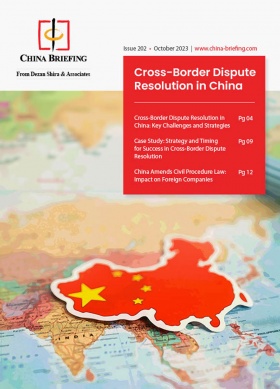
DEZAN SHIRA & ASSOCIATES
Meet the firm behind our content. Visit their website to see how their services can help your business succeed.
Want the Latest Sent to Your Inbox?
Subscribing grants you this, plus free access to our articles and magazines.
Get free access to our subscriptions and publications
Subscribe to receive weekly China Briefing news updates, our latest doing business publications, and access to our Asia archives.

Your trusted source for China business, regulatory and economy news, since 1999.

Subscribe now to receive our weekly China Edition newsletter. Its free with no strings attached.
Not convinced? Click here to see our last week's issue.

Search our guides, media and news archives
Type keyword to begin searching...
Extended Navigation
Xi and albanese meet in beijing.
Xi Jinping and Australian Prime Minister Anthony Albanese met for the second time in Beijing today. It’s the strongest signal to date that ties between their two countries are improving after years of tensions.
Something went wrong. Error code 1.
This feature is only available for paying subscribers. You can continue reading without saving your preference, or you can subscribe now.
Subscribe Now
Already a subscriber? Log in here.
This feature is for paid subscribers only.
Share this article
- Share on LinkedIn
- Share on Facebook
- Share on Twitter
- International edition
- Australia edition
- Europe edition

A new chapter: how China sees Albanese’s ‘ice-breaking’ state visit
Chinese state media have previously viewed Australia’s actions as blindly following the US. Does a resumption of dialogue signal a change?
- Get our morning and afternoon news emails , free app or daily news podcast
It’s a busy time in Beijing – this autumn has already hosted a major Belt and Road forum, international dignitaries, and a security summit. But an upcoming visit by the Australian prime minister has also prompted a flurry of preparations and discussion.
Anthony Albanese’s three-day tour of Shanghai and Beijing , the first prime ministerial visit to the country in seven years, is being warmly welcomed. He is expected to meet with the premier, Li Qiang – the host of the official visit – and the president, Xi Jinping, with whom Canberra has said Albanese will raise tough issues.
Chinese state media reporting on the upcoming visit have characterised the trip as a new chapter of the turbulent Australia-China relationship, a thawing of a frost which had hardened over recent years. Many reports have lauded the return to higher trade. On Thursday, a lengthy interview in the People’s Daily with the former trade minister, Andrew Robb, was glowing about the economic relationship and hope for the future.
The official outlet China Daily described the trip as politically and economically “ice-breaking” after dialogue halted in 2016 “because of the previous Australian government’s adversarial stance toward China”.
Reports and Chinese officials who spoke to the Guardian cited Australia’s Huawei ban, early calls for a Covid-19 inquiry, and the 2020 Asio raid on Chinese state media reporters . Several said a key point of tension was Canberra’s strengthening of regional partnerships which appear targeted towards China – including Aukus, the Quad and strengthening ties with Japan – and its “interference” in the South China Sea.
Sign up for Guardian Australia’s free morning and afternoon email newsletters for your daily news roundup
Beijing has characterised much of Australia’s actions as blindly following the US, China’s major rival. “For most of its history, Australia has been reluctant to exercise independence and to partner with the countries in its region,” said a China Daily editorial.
“I don’t think Australia should pick and choose between China and the United States,” said Victor Gao, chair professor at Soochow University, in a video op-ed published by the Global Times.
“Australia is not a competitor for China – militarily, politically speaking, economically speaking, in terms of trading relations.”
In Beijing, a senior analyst at a Chinese thinktank told the Guardian that Australia needed to think “more independently”.
Several concessions were made before the visit. Tariffs on wine and other Australian imports have been lifted in return for Australia easing restrictions on Chinese windtowers. The Australian journalist Cheng Lei was released from detention after almost three years on undefined national security charges, although it was officially explained as the conclusion of criminal justice processes.
Last month, a small group of Australian journalists, including this reporter, were invited to China. The tightly managed trip was the resumption of a decade-long exchange program between the Australia Pacific Journalism Centre and the Chinese Communist party-linked All-China Journalists Association. The program had paused because of the pandemic, but its resumption remained on ice amid the souring relations.
after newsletter promotion
It was suggested the week-long trip was both a gesture of goodwill ahead of Albanese’s visit, and something of a test. No Australian media outlets have had correspondents in China since the ABC’s Bill Birtles and Michael Smith from the AFR fled in 2020 after being interrogated by security services.
Under the authoritarian rule of Xi, candid conversations with people inside China has become increasingly difficult and – if opinions are critical of the CCP – dangerous. Voices from outside the tour spoke of a chilling of critical conversation, and a suspicion that there was little if any critical information reaching Xi from fearful subordinates. One noted that leader-to-leader meetings like Albanese’s were increasingly crucial as the only way to guarantee Xi was receiving a complete message.
In discussion about the decline in relations, party officials, thinktankers, state media journalists and business people supported a common state media narrative that the blame lay entirely with the Morrison and Turnbull governments – nevermind that the Albanese government has largely stuck to the same foreign policy stance.
“Sensational” Australian media reporting about the threat of China was also noted, as was domestic concern about levels of foreign investment in Australia’s property market. Australian concern over China’s human rights abuses in Xinjiang was rejected, but there was surprising acceptance of the reputational damage done by its crackdown in Hong Kong. Objections to Beijing’s threats to Taiwan were roundly dismissed as not the world’s business. Few would speak about the release of Cheng Lei, either declining or answering a completely different and unasked question. None would talk of Yang Hengjun, still in prison.
Additional research by Chi Hui Lin
- Australia news
- Anthony Albanese
- Asia Pacific
- Australian foreign policy
Most viewed
We've detected unusual activity from your computer network
To continue, please click the box below to let us know you're not a robot.
Why did this happen?
Please make sure your browser supports JavaScript and cookies and that you are not blocking them from loading. For more information you can review our Terms of Service and Cookie Policy .
For inquiries related to this message please contact our support team and provide the reference ID below.

Global Times reporter following Australia and Japan issues, also with a focus on social issues and overseas studies.

Chu Daye is a business reporter at the Global Times focusing on general topics, trade, investment and energy.
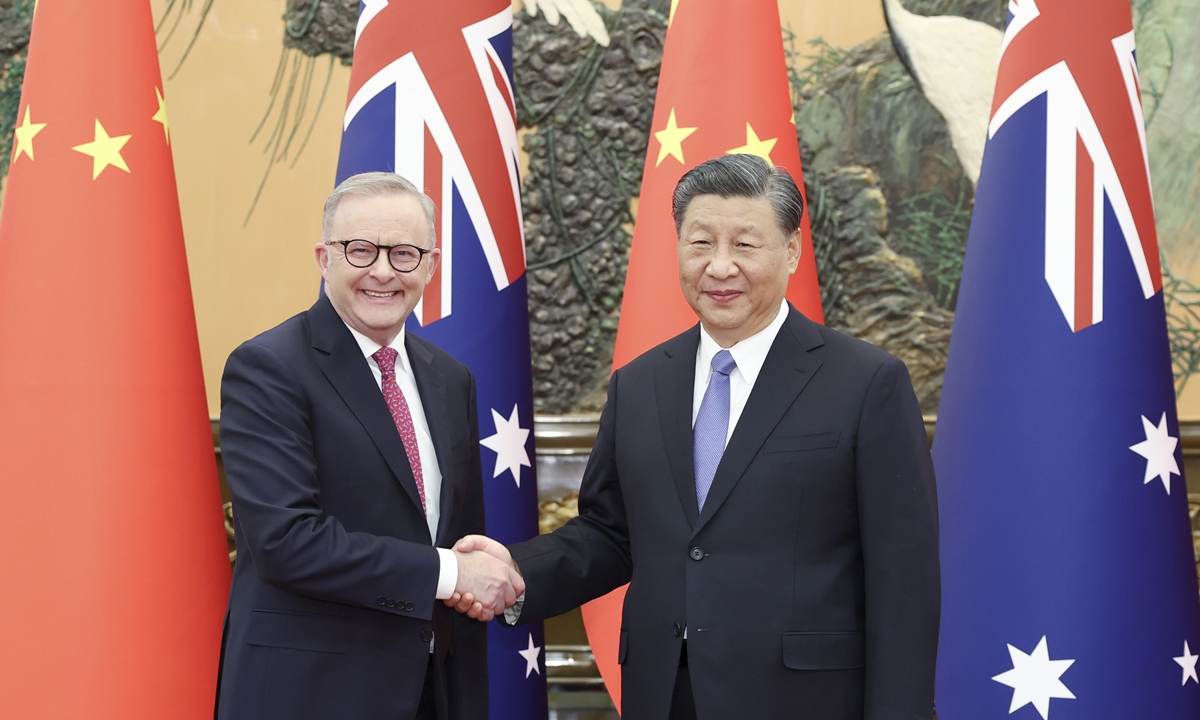
Chinese President Xi Jinping meets with Australian Prime Minister Anthony Albanese at the Great Hall of the People in Beijing on November 6, 2023. Photo: Xinhua
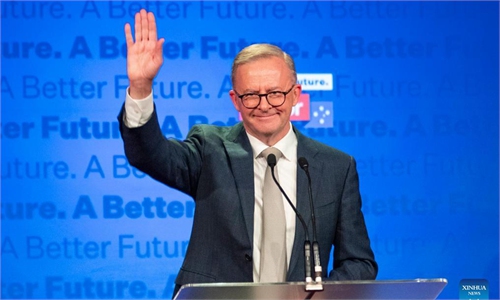
The visit of Australian Prime Minister Anthony Albanese will not only be about warming up China-Australia relations, but ...
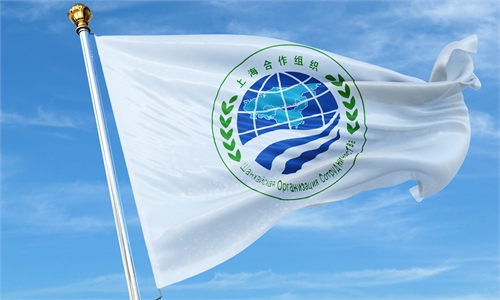
Chinese Premier Li Qiang on Tuesday starts his four-day trip to Kyrgyzstan, attending the 22nd Meeting of the ...
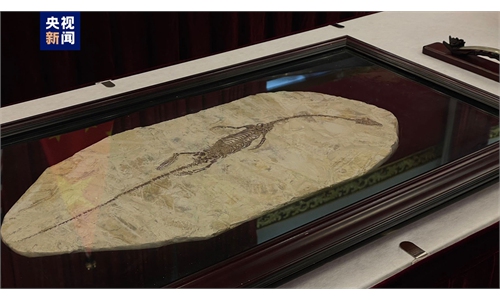
Australia repatriated four cultural relics and artworks, and one paleontological fossil lost overseas to China on Wednesday, demonstrating ...
Australia's Prime Minister Anthony Albanese is scheduled to start a visit to China from Saturday amid heightened anticipation ...

With an Albanese visit to China on the cards, has Beijing overplayed its hand with hostage diplomacy?
Analysis With an Albanese visit to China on the cards, has Beijing overplayed its hand with hostage diplomacy?
There's a Chinese phrase that's a fitting description of the current dynamic between China and Australia — trying to steal a chicken, but instead losing a handful of rice.
In other words, losing something within your grasp by overreaching.
Simmering trade disputes and the arrest of two Australian citizens in China, at a time when diplomatic tensions were at their most frigid, once served Beijing's "wolf warrior" diplomacy tactics.
But years later, Beijing could be paying for the cost of those decisions, as they cast a shadow of doubt over a possible visit to China by Prime Minister Anthony Albanese this year.
This week, Australia's Foreign Minister Penny Wong met China's top diplomat Wang Yi for the fourth time in a year, at the ASEAN Foreign Ministers' Summit in Jakarta.
The focus of the meeting was the most important item on Wang's to-do list — confirming Albanese's visit to China.
Wong did not confirm the visit, amid questions about whether China is setting the right conditions ahead of such a trip.
"The prime minister has been invited to Beijing. We would hope for the most positive circumstances for such a visit," she said.
"My view is we're seeing some progress on trade. We would like to see more.
"In relation to the Australians detained, I think China is well aware of the priority Australia places on movements there and that's why the prime minister and I have continued to raise those particular cases in our interactions with our counterparts."
Australian citizens Cheng Lei and Yang Hengjun have been detained in China for more than two years, in addition to two other Australian citizens — one given a death sentence, the other life in prison — on drugs charges.
The complexity of Yang's case lies in the fact that he worked for China's Ministry of State Security before he became an Australian citizen, and China has refused to recognise his Australian citizenship.
Cheng Lei's case has made little progress in the past two years, and has been described as an example of "hostage diplomacy" by many human rights lawyers in China.
This concept has been Beijing's longstanding practice against Western countries.
However, as Cheng's detention in China approaches the three-year mark, there are increasing signs that Beijing is also facing consequences over the arbitrary detention of the Australian citizen.
The fate of Cheng Lei
More than a year after Cheng's closed-door trial, she is still waiting for a verdict. Without the closure of a sentence, her release remains unlikely.
Many Australians might be hoping Albanese could bring Cheng on his plane back to Australia, but it's more likely that any resolution in her case will be quietly worked out and kept under wraps.
This is because China's legal system follows "rule by law" with Chinese characteristics, which means the law serves the regime.
In other words, the Chinese Communist Party (CCP) can override the legal system.
Li Shixiang, a human rights activist who has helped with the case of one Singaporean death row inmate in China, said the court might be still trying to find evidence to support the national security charges, or it could be weighing up the sentence based on the state of relations between Canberra and Beijing.
The judicial system can also resort to arbitrary detentions of foreign nationals and even increase sentences on appeal.
But on the positive side, it means that the interaction between high-level dignitaries can ultimately be effective in securing a prisoner's release.
Li said due to the vague and broad definition of a state secret, Cheng's case could be a "pocket crime" — a term for prosecuting dissent.
"The Chinese judicial system is a political weapon, and people in the judicial system must be loyal to the party," he said.
"Foreigners can become diplomatic hostages, it's a tactic in China's diplomacy.
"Those cases were resolved by diplomacy, not by law."
But under President Xi Jinping, a superpower will never bow to a middle power.

The changing face of Chinese diplomacy
The warming of Australia-China relations comes at one of the most extraordinary moments in the country's history, when Xi demolished presidential term limits and became president for life.
Not only has it shattered the world's illusion that China would embrace democracy as it moves towards prosperity, but it has also created a huge trust deficit between China and the West.
Such a reality presents a huge headwind for Xi's efforts to realise the great rejuvenation of the Chinese nation and to exert more significant influence in global affairs.
Coupled with the outcry from the Chinese people and even within the CCP over the systematic regression in the political arena, Xi desperately needs to legitimise his regime by engaging world leaders after three years of COVID-zero policy.
Australia plays a key role in Xi's vision, laying the groundwork for a repair of diplomatic relations between China and the United States, and for improved interactions between China and the West more broadly.
But the difference between pragmatic democratic governments and idealist authoritarian regimes is that while China would see Albanese's visit as a symbolic moment to begin resetting the relationship, Australia might want to see more concrete assurances before agreeing to the visit.
The delay in finalising Albanese's visit to China may hurt Beijing's reputation, and the answer is still pending for China's application to join the Comprehensive and Progressive Agreement for Trans-Pacific Partnership (CPTPP).
Australia has a veto vote, which may concern Beijing after an ugly few years on the trade front, while Taiwan is also vying for a spot in this partnership — something China wants to avoid.
Chinese diplomats are adopting a sycophantic posture not seen in nearly a decade, in a departure from the wolf-warrior diplomacy. But for Xi, taking a step forward before Australia moves would mean a loss of face.
Trade barriers can be dismantled, and political differences set aside, but the ongoing detention of Australian citizens cannot be easily ignored.
Fixing such disputes is nothing new for China.
When Canada released Meng Wanzhou, Huawei's former chief financial officer, China immediately put two Canadian detainees on a plane back as an exchange.
Two Chinese Americans, Cynthia Liu and Victor Liu, who had been banned from leaving China, also managed to return home the next day.
Their lawyer Marc Ginsberg said that the release of the two American citizens had been facilitated by a phone call between Xi and US President Joe Biden.
Today, diplomatic hostages are not only a blight for Beijing, but also potentially harmful to China's claimed sovereignty and trade interests.
Chinese diplomats might have already learned a hard lesson from the short-sighted wolf-warrior era – they may have shot themselves in the foot in the long term.
- X (formerly Twitter)
Related Stories
Penny wong in frank talks with china over trade and human rights at asean summit.
Why China initially only told half the story about its 'hostage diplomacy' for Huawei's 'princess'
'Malicious activity': Australia joins Canada in demanding an end to hostage diplomacy
- Federal Government
- Foreign Affairs
- Government and Politics
- Human Rights
- International Law
- Law, Crime and Justice
- World Politics

Why ‘Team Australia’ needs a new sports diplomacy game plan as other countries gain an edge
Bond University
Disclosure statement
Stuart Murray does not work for, consult, own shares in or receive funding from any company or organisation that would benefit from this article, and has disclosed no relevant affiliations beyond their academic appointment.
Bond University provides funding as a member of The Conversation AU.
View all partners
Writing of the unique place of sport in Australian society, the celebrated US travel writer Bill Bryson once wrote “truly, never has there been a more sporting nation … it is a wonder in such a vigorous and active society that there is anyone left to form an audience”.
Sport is a vital part of who we are, how others see us , and – these days – a low-risk, low-cost and high-profile diplomatic tool in an increasingly divisive geopolitical landscape.
Countries such as China, Saudi Arabia and Russia are investing in the sports diplomacy game and, arguably, Australia’s edge in this niche area of international relations has dulled a little .
Earlier this week, however, Australia’s foreign and sports ministers announced it was time to sharpen that edge, freshen up the team and make Australia stronger and more influential through sport .
Why Australia needs a new strategy
In response to the first periodic review of the Sports Diplomacy 2030 Strategy, the Albanese government announced it will update the strategy, form a new Sports Diplomacy Consultative Group – coordinated by the Department of Foreign Affairs and Trade (DFAT) – and hold an annual round-table discussion that brings the worlds of sport and diplomacy together.
These initiatives provide a forum to discuss strategic and economic opportunities, risks in international sport, upcoming sports events in Australia and offshore, and ways in which government and the sport sector can work together to advance shared priorities.
Team Australia, in other words, has a new game plan, a bigger squad and an annual strategic retreat.
The announcement is timely. Arguably, Australia is slipping behind while other countries forge ahead.
For example, China spent A$74 million on a new stadium in the Solomon Islands for last year’s Pacific Games and also invited Pacific athletes to train in China.
China has also poached high-profile “diplomats in tracksuits” such as Eileen Gu – a brilliant Chinese-American downhill skier brought up in California who chose to represent China at the 2022 Beijing Winter Olympics.
While most sports fans can list assets and teams bought by Saudi Arabia’s Public Investment Fund – such as the 2021 takeover of English Premier League team Newcastle United and the controversial LIV Golf Tour set up to rival the PGA Tour – they would know less about Riyadh’s training in sports diplomacy.
In February 2024, The United Nations Institute for Training and Research ran a five-day executive diploma in sports diplomacy program for participants from the Ministry of Sport of Saudi Arabia and the Saudi Olympic and Paralympic Committee in Geneva.
Russia has also weaponised sport, from using mega events to deflect attention from its invasion of other countries to Gazprom – the state-owned multinational energy corporation – proposing a Russian version of the Champions League .
What does sports diplomacy offer?
Sport, when allied to diplomacy, offers western liberal democracies like Australia an authentic, comparative and meaningful advantage over our rivals.
In addition to a bulging trophy cabinet, Australia possesses world class facilities, infrastructure, expertise and sports people.
Programs like PacificAus Sports – responsible for the men’s and women’s Fijian Drua Super Rugby teams, and the PNG Hunters Rugby League teams – are world class.
Australians value integrity, fair play and equality in sport. Some of our current and former athletes such as Curtis McGrath, Sam Kerr, David Pocock, Adam Goodes, Kim Brennan and Marissa Williamson-Pohlman (who will be the first Indigenous woman to represent Australia in boxing at the Olympics this year) are as powerful, genuine and effective off the pitch as they are on it.
Sports diplomacy, when done well, can break down stereotypes , transcend acrimony and bring people closer together via a shared affinity for physical pursuits.
Meetings between, for example, sports administrators, government officials, and business people on the sidelines of a game create informal relationships that complement formal diplomatic initiatives, such as Australia’s desire to better engage Southeast Asia via a new $2 billion push .
International sport generates public diplomacy opportunities, builds relationships and can amplify a state’s message, culture and values.
Raising the game
The Albanese government’s new approach to sports diplomacy provides a chance to challenge our rivals but only if we think like our sportspeople. We need to work and train hard, innovate and try even harder.
Let’s hope other government agencies continue to get behind DFAT as the ongoing team captain, too. The Australian Federal Police, Australian Defence Force, Sports Integrity Australia and many other government agencies are also now using sports diplomacy.
Finally, there’s also no point investing in the practice of sports diplomacy if it isn’t analysed, measured, studied and researched by the next generation of academics and universities.
While countries like Israel, Hungary and Saudi Arabia are developing research centres and university courses on sports diplomacy, the same cannot be said of Australia.
Diplomatic practice, it should be remembered, is only as good as the theory it is built upon.
Bill Bryson was right. For a relatively small population, there are few countries that are as good, or as addicted, to sport as Australia.
Games, sport and physical pursuits play a massive role in our culture, society and identity. These things deserve to be front and centre of our diplomacy.
- Sports diplomacy
- Sport governance
- Sport and Society

Head of School, School of Arts & Social Sciences, Monash University Malaysia

Chief Operating Officer (COO)

Clinical Teaching Fellow

Data Manager

Director, Social Policy
- Politics & Security
- Economy & Business
Have Turkey, China hit reset button on Uyghurs as Fidan visits Xinjiang?
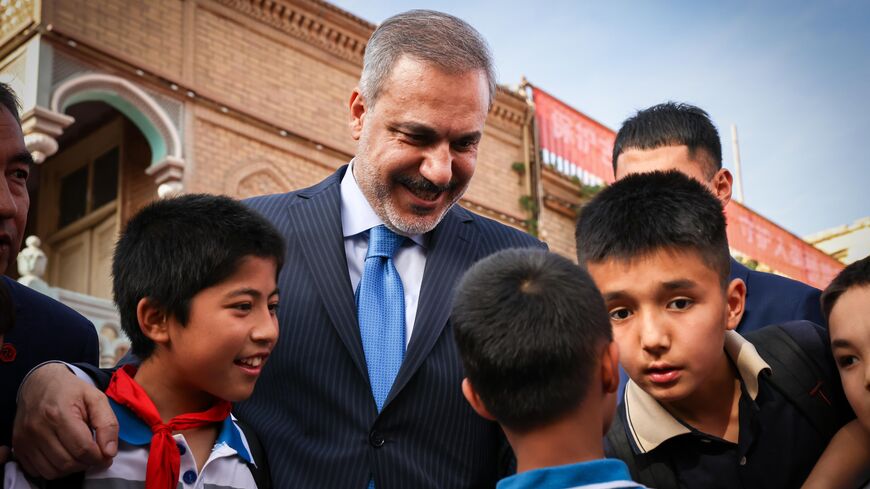
ANKARA — Turkish Foreign Minister Hakan Fidan’s visit to China marked an important turning point in Turkey-China ties amid a display of joint desire for closer relations —disagreements notwithstanding — but some of the rhetoric during the trip raised eyebrows in the West.
Fidan ended his three-day official visit to China on Wednesday in the Xinjiang Uyghur Autonomous Region in northwest China after holding talks with Chinese officials in Beijing, including his counterpart, Wang Yi, as well as Vice President Han Zheng on Monday and Tuesday.
Wearing a blue tie the same shade as the blue-white East Turkestan Uyghur flag, Fidan met with local officials and walked down the streets of the region's capital, Urumqi, and Kashgar.
His outfit choice on Wednesday seemed like an effort on Fidan’s part to send a symbolic message to the Uyghur community in Turkey — one of the largest and most vocal Uyghur diasporas in the world — and to the broader international public that Ankara’s ties with Beijing wouldn’t come at the expense of China’s largest Muslim minority.
Turkey is home to around 100,000 Uyghurs, a Muslim minority of Turkic origin who lives primarily in China’s Xinjiang region. Human rights organizations have repeatedly pointed to a campaign of repression by China against the Uyghur community.
The international community accuses Beijing of mass oppression of Uyghurs through incarcerating tens of thousands in a bid to strip them of their Muslim identity. The issue, which tops the list of bilateral differences between Ankara and Beijing, led to a major escalation between the two capitals in 2019, when Turkey brought the minority's plight up at the United Nations, condemning Beijing for “torturing” more than a million Uyghurs.
But all appeared reconcilable as Fidan met with his Chinese hosts. Still, the top Turkish diplomat stopped short of referring to the autonomous region by its Chinese name “Xinjiang,” instead describing the two cities as “historically Turkic Muslim” cities.
Through these subtle messages, Fidan was also diplomatically calling on Beijing to revisit its Uyghur policies, according to Nurettin Akcay, a Turkish academic at Ankara’s Yildirim Beyazit University who received his PhD at Shanghai University in Turkey-China ties.
“The message which is being signaled is that Turkey wants to improve its relations with Beijing. It also respects China's territorial integrity and sensitivities,” Akcay told Al-Monitor. “However, China also has to pay attention to Turkey's sensitivities. China should be more careful in its policies toward the Uyghurs.”
Mutual maturity
Fidan’s description of Urumqi and Kashgar as “historically Turkic Muslim" cities ruffled some feathers in China, according to Akcay, but “the Chinese side hasn't expressed their disgruntlement publicly because they do not want to escalate the issue to a level that could damage the ties.”
Sibel Karabel, the head of the Southeast Asian Countries Strategic Studies and Research Center at Istanbul's Gedik University, concurred. “This issue was almost a taboo between the two sides,” she told Al-Monitor. “I believe that it was handled with great maturity from both sides.”
The successful compartmentalization, in turn, could lay the foundation for closer Turkey-China ties. “I'm fascinated by the Urumqi Kashgar leg of the visit,” Soner Cagaptay, director of the Turkish research program at the Washington Institute for Near East Policy, told Al-Monitor. “It didn't look like Fidan was able to address the persecution that the Uyghurs are facing. So perhaps that is big enough for now for the Chinese to get from Turkey.”
“Considering the difference between the two countries, it's a baby step toward Turkey and China ever establishing what I would call a great power, middle power kind of relationship.”
China also has reasons to push for closer ties with Turkey. “It is a time when China also needs to diversify its investments,” Karabel said.
China’s investments in Europe have drastically decreased over the past years, largely due to increasing Western scrutiny and restrictions against Chinese companies.
Turkey, located at a juncture between Europe and the Middle East, provides opportunities for China’s Belt and Road initiative, according to Karabel.
Fidan’s visit to China marked the first of its kind since his predecessor, Mevlut Cavusoglu, visited the Asian powerhouse in 2022, and his trip to Xinjiang marked another first since Turkish President Recep Tayyip Erdogan’s visit there in 2012 as then prime minister.
Cavusoglu blasted Beijing last year for dictating terms for the Turkish ambassador’s request to visit Xinjiang: “Why would we be a tool of Chinese propaganda?” the then top Turkish diplomat snapped. But after Erdogan’s victory in the May 2023 presidential and parliamentary elections, Ankara moved on to foreign policy restoration and shifted to more constructive diplomacy largely aimed at attracting investments to its ailing economy. The country’s annual inflation hit more than 75% last month.
China is the third-largest trade partner of Turkey, with the two countries' trade volume exceeding $47 billion last year; Turkish exports to the Asian powerhouse stood at a meager $3 billion. The measures aimed at easing the imbalance were one of the top issues discussed in the Fidan-Wang meeting, the Turkish foreign minister said during the joint presser.
Ankara seeks more direct Chinese investments in Turkey as well as the lifting of restrictions on Turkish agricultural exports to China. “We particularly would like to focus on cooperation in the energy field,” Fidan said.
His visit comes a week after Turkish Energy Minister Alparslan Bayraktar's visit to the global power. Speaking after the visit, Bayraktar said the two countries were close to a deal on a new nuclear plant. In addition to the Russian-built Akkuyu Nuclear Power Plant in Turkey’s southeast, Ankara is in talks with Russia and China for the country’s second and third nuclear power plants.
Echoing Xi, ruffling feathers in Washington
Fidan also lashed out at the West during the visit, using China's rhetoric of empowering the Global South.
In remarks echoing Chinese President Xi Jinping’s oft-repeated line of “common prosperity,” Fidan said, “There is enough prosperity for everyone in our world.”
“The markets established by the dominant powers in the previous century are changing hands again under more fair and competitive market conditions; this is a result that must be acknowledged,” he went on.
The remarks were in contrast with Ankara’s efforts to rebuild trust with Washington after turbulent years and a positive momentum in Turkey-US ties following the Turkish nod to Sweden’s NATO membership in January.
But according to Alper Coskun, a retired Turkish diplomat and current senior fellow at the Carnegie Endowment, Fidan’s statement, which positions NATO-member Turkey “as a party” in the conflict between the United States and China, “comes at a cost.”
“It can deepen the trust erosion between Ankara-Washington,” he told Al-Monitor. A potential Chinese undertaking of the planned nuclear power plant in Turkey stands out as another issue that will fuel questions over Ankara’s commitment to the Western alliance.
“Of course, global realities require Turkey to work with China and establish reasonable ties with Russia,” Coskun said. “But Turkey gives the impression of wobbling too much.”
Related Topics
Sign up for our newsletter, daily briefing, the takeaway, week in review, business & tech briefing, security briefing, china-middle east briefing, gulf briefing, turkey briefing, israel briefing, palestine briefing, us confrontation with iran’s proxies: live q&a with jared szuba and elizabeth hagedorn.

The Israel-Hamas War: Live Q&A with Amb. David Satterfield (Part 2)

Choose your path to continue reading
Enjoy your complimentary article.
Provide your email and get free access to one article.
Thank you! Check your email to view your article.
You have already accessed your free article. Please consider subscribing to access all of Al-Monitor.
Or get unlimited all-access
Subscribe now to access all Al-Monitor content.
- All News & Analysis
- Memos & Reports
- All Newsletters
Oops! It looks like you already enjoyed your free article
To continue reading Al-Monitor articles, please subscribe.
Get unlimited all-access

High-speed sleeper trains to depart Hong Kong at night, arrive in Beijing, Shanghai in morning from June 15
- China Railway announces that through train to the two mainland cities will be replaced and upgraded with high-speed services
- Chief Executive John Lee welcomes new arrangement and expresses gratitude to central government and China Railway for their 'care'
High-speed sleeper trains will run overnight between Hong Kong, Beijing and Shanghai from this month in a new measure Chief Executive John Lee Ka-chiu has said will boost integration with mainland China.
China Railway said on Tuesday that the high-speed services would slash travel time by half, offer more seats at 600 and replace the suspended through train running between Hung Hom in Hong Kong and the two mainland cities.
The news effectively spells the end to the historical cross-border intercity through train services after more than 110 years of operation.
Do you have questions about the biggest topics and trends from around the world? Get the answers with SCMP Knowledge , our new platform of curated content with explainers, FAQs, analyses and infographics brought to you by our award-winning team.
The service has been suspended since the Covid-19 outbreak in 2020.
High-speed trains operating a return service will leave from Hong Kong's West Kowloon terminus and will only take around 12 1/2 hours to get to Beijing West station and 11 hours and 14 minutes to pull into Shanghai Hongqiao station.
The overnight trains, running from Friday to Monday from June 15, will have a sleeper service.
The Beijing-bound train will depart at 6.24pm on each day and arrive in the capital at 6.53am the next day. The service to Shanghai will leave at 7.49pm and arrive there at 6.45am the next morning.
City leader Lee welcomed the announcement and said he was grateful to the central government and China Railway for their "care".
"The new train services are convenient and fast," Lee said before his weekly meeting with advisers on the key decision-making body the Executive Council .
"It will drastically save travelling time and only take a half-day to arrive, which will also help people save on hotel costs."
"According to the latest arrangement, the train will stopover in Hangzhou, Hebei and so on which allow travellers to come to Hong Kong's West Kowloon terminus directly," he added.
Lee added that customs clearance would be more convenient through the existing "co-location" checkpoint between Hong Kong and the mainland.
"It has significant meaning in fostering the people-to-people, business-to-business exchanges and integration between Hong Kong and the mainland," he said.
Lee added he had tasked the Transport and Logistics Bureau, and rail operator the MTR Corporation, with implementation of the new measures.
The MTR Corp said fares on the Beijing-bound train D910 and its return train D909 on Saturday, June 15, and on Monday, June 17, were pegged at HK$1,031 (US$132) for upper deck sleepers, HK$1,163 for lower deck sleepers and HK$937 for ordinary seats.
Sleeper fares will be about 12 per cent higher on Sunday, June 16 on Beijing-bound train D910.
Fares will be HK$1,163 for an upper deck berth, HK$1,306 for a lower deck one. The standard fare for a seat on the train will remain at HK$937.
For the Hong Kong-bound train D909, the upper deck sleeping berth will cost HK$1,284, the lower deck one will be priced at HK$1,448 and will also retain the HK$937 standard seat cost.
The D908 service to Shanghai and its return D907 service will make its debut on June 15.
There are more types of fares on these services, with the lowest HK$682 for an ordinary seat, HK$878 for an upper deck sleeper and HK$987 for a lower deck one.
A premium upper deck sleeper will cost HK$1,613, with a lower deck one priced at HK$1,821. These prices will apply to both June 15 and 17 for the Shanghai-bound trains.
Fares on the Shanghai-bound D908 and its return D907 service on June 16 will start from HK$682 for an ordinary seat. An upper deck sleeper will cost HK$1,009 and a lower deck sleeper will be priced at HK$1,141.
The price for a premium upper deck berth will be HK$1,887 and HK$2,128 for a lower deck one.
Tickets will go on sale from noon on Wednesday, June 5 at the website 12306 China Railway and its 12306 app.
Prices for services after June 17 will be announced on the website.
"The latest arrangement provides an alternative option to travel between Hong Kong, Beijing and Shanghai which foster the exchanges between the regions in various aspects," Jacob Kam Chak-pui, the MTR Corp's CEO said.
Two high-speed return services are at present available between Hong Kong and Beijing every day, but without sleeper carriages.
Shanghai has similar arrangements. The two routes - Hong Kong to Beijing and Hong Kong to Shanghai - take about eight hours from start to finish.
Hong Kong Tourism Association executive director Timothy Chui Ting-pong said he expected ticket prices for the overnight services to be in line with the cost of an airline ticket.
"As the prices of train tickets are more stable than air tickets, it is believed that taking the trains to Shanghai and Beijing will be more popular," he said.
Chui also highlighted that the availability of plane tickets to Beijing and Shanghai was always limited because of the number of people who travel there on business - but added that demand for overnight trains was also expected to be high.
"It is estimated that the demand for train tickets will exceed the supply during summer," he said.
Gary Zhang Xinyu, a lawmaker, agreed the new trains would attract businesspeople as they could cut down on accommodation costs and save time, especially over weekends.
"It is the right time to launch the new arrangement which may also facilitate local tourism and the economy," Zhang said.
More Articles from SCMP
‘An old issue’: China, Iran to continue ‘strong relations’ despite Beijing’s stance on disputed Gulf islands
Hong Kong to allow employers to check self-employed tutors, coaches for record of sexual offences before hiring
Hong Kong courts will make ‘red lines’ on national security clear through decisions on cases, outgoing Law Society president says
Chinese carmakers brace for EU tariffs on electric vehicles from July 4
This article originally appeared on the South China Morning Post (www.scmp.com), the leading news media reporting on China and Asia.
Copyright (c) 2024. South China Morning Post Publishers Ltd. All rights reserved.

- Work & Careers
- Life & Arts
Become an FT subscriber
Try unlimited access only $1 for 4 weeks.
Then $75 per month. Complete digital access to quality FT journalism on any device. Cancel anytime during your trial.
- Global news & analysis
- Expert opinion
- Special features
- FirstFT newsletter
- Videos & Podcasts
- Android & iOS app
- FT Edit app
- 10 gift articles per month
Explore more offers.
Standard digital.
- FT Digital Edition
Premium Digital
Print + premium digital, ft professional, weekend print + standard digital, weekend print + premium digital.
Essential digital access to quality FT journalism on any device. Pay a year upfront and save 20%.
- Global news & analysis
- Exclusive FT analysis
- FT App on Android & iOS
- FirstFT: the day's biggest stories
- 20+ curated newsletters
- Follow topics & set alerts with myFT
- FT Videos & Podcasts
- 20 monthly gift articles to share
- Lex: FT's flagship investment column
- 15+ Premium newsletters by leading experts
- FT Digital Edition: our digitised print edition
- Weekday Print Edition
- Videos & Podcasts
- Premium newsletters
- 10 additional gift articles per month
- FT Weekend Print delivery
- Everything in Standard Digital
- Everything in Premium Digital
Complete digital access to quality FT journalism with expert analysis from industry leaders. Pay a year upfront and save 20%.
- 10 monthly gift articles to share
- Everything in Print
- Make and share highlights
- FT Workspace
- Markets data widget
- Subscription Manager
- Workflow integrations
- Occasional readers go free
- Volume discount
Terms & Conditions apply
Explore our full range of subscriptions.
Why the ft.
See why over a million readers pay to read the Financial Times.
International Edition

IMAGES
COMMENTS
Anthony Albanese is wrapping up his whirlwind three-day trip in China, aimed at stabilising ties between the two countries. On Tuesday, he was given a ceremonial welcome at Beijing's Great Hall of ...
In Beijing, Albanese will meet with China's Premier Li Qiang and Chinese President Xi Jinping at the Great Hall of the People. ... Much of the legwork leading up to Albanese's visit has ...
Sep 7, 2023 - 2.11pm. Jakarta | Anthony Albanese will become the first Australian prime minister to visit China in seven years, in a trip he will use to push for the easing of remaining trade ...
Australian Prime Minister Anthony Albanese (left) meets with Chinese President Xi Jinping during a visit to Beijing, China, Nov. 7, 2023. Credit: Facebook/ Anthony Albanese
Albanese's visit to China represented a culmination of 18 months' effort by him and his government to lower the temperature between Canberra and Beijing and stabilise the relationship.
CANBERRA, Australia (AP) — Australian Prime Minister Anthony Albanese said he will visit China in early November to meet President Xi Jinping, making the announcement Sunday hours before he departed for the United States to meet with President Joe Biden. The Chinese visit dates were confirmed a day after Beijing agreed to review the crippling ...
The visit will be the first by an Australian prime minister to China since 2016. Mr Albanese had been widely tipped to visit China this year, having met with his Chinese counterpart, Xi Jinping ...
Before coming to Beijing, Albanese was a guest at the opening ceremony of an annual import expo in Shanghai on Sunday at which Chinese Premier Li Qiang pledged to further relax market access. Albanese's visit comes around the 50th anniversary of the first trip by an Australian prime minister to the People's Republic of China.
Australian Prime Minister Anthony Albanese will travel to Beijing on Saturday, a little over 50 years since his predecessor Gough Whitlam's historic journey to China.
Coming just nine days before Anthony Albanese's much-anticipated visit to Beijing, there was no mistaking the message: the Biden Administration remains focused on China despite everything else ...
Earlier on Monday, Albanese stopped by Beijing's iconic Temple of Heaven and posed for a photograph at the circular Echo Wall where Australia's then prime minister, Gough Whitlam, stood in 1973, a ...
Albanese announced he had taken up Xi's offer to visit Beijing this year after meeting Chinese Premier Li Qiang, Beijing's second-in-command, on the sidelines of the East Asia Summit in ...
As Australia and the U.S. look to address China's near dominance of the vital critical minerals market, Anthony Albanese is the first Australian leader to visit Beijing in seven years.
PM Albanese is expected to travel to Beijing by end of 2023; Diplomat says slowing economic growth in China is temporary; WATCH: Chinese Ambassador to Australia Xiao Qian discusses former Prime ...
The historic visit by Albanese to China this week was the first by an Australian prime minister in seven years. ... Key points of tension, from Beijing's perspective, include the banning of ...
Subsequently, in Beijing, Albanese met with Chinese President Xi Jinping, with the aim to further strengthen and advance Australia's relationship with China. Albanese's much-anticipated visit to China marks the first trip by an Australian leader to the country since 2016, and notably his first visit as Prime Minister. It comes as a crucial ...
Australian Prime Minister Anthony Albanese met with Chinese leader Xí Jìnpíng 习近平 today in Beijing. Albanese is currently on a highly anticipated visit to China from November 4 to 7. He is the first Australian leader to visit the country since 2016 and his trip is a notable step toward stabilizing diplomatic ties after years of tensions.
Anthony Albanese's three-day tour of Shanghai and Beijing, the first prime ministerial visit to the country in seven years, is being warmly welcomed. He is expected to meet with the premier, Li ...
May 18, 2023 - 6.21pm. Beijing has lifted trade sanctions on Australian timber imports and revealed advanced plans to have Anthony Albanese visit "as early as possible", in what would be the ...
Ryan Neelam, Public Opinion and Foreign Policy Program Director at the Lowy Institute, discusses his key takeaways from Australian Prime Minister Anthony Albanese's visit to Beijing. He speaks ...
Photo: Xinhua. "Your visit can be described as carrying on the past and opening up the future," Chinese President Xi Jinping told visiting Australian Prime Minister Anthony Albanese in Beijing on ...
Albanese is the first Australian prime minister to visit Beijing in seven years, which reflects a stabilisation in the relationship between the two countries that had soured in 2020 when the ...
The delay in finalising Albanese's visit to China may hurt Beijing's reputation, and the answer is still pending for China's application to join the Comprehensive and Progressive Agreement for ...
Why Australia needs a new strategy. In response to the first periodic review of the Sports Diplomacy 2030 Strategy, the Albanese government announced it will update the strategy, form a new Sports ...
The new service will reduce travel time between Hong Kong and Beijing to 12.5 hours, down from more than a full day. Similarly, journeys to Shanghai will be shortened to 11 hours from the previous ...
ANKARA — Turkish Foreign Minister Hakan Fidan's visit to China marked an important turning point in Turkey-China ties amid a display of joint desire for closer relations —disagreements notwithstanding — but some of the rhetoric during the trip raised eyebrows in the West.. Fidan ended his three-day official visit to China on Wednesday in the Xinjiang Uyghur Autonomous Region in ...
May 28, 2023 - 1.32pm. Now that the prime minister has received an official invitation to visit Beijing later this year, the political and diplomatic lines are being drawn. The partisan ...
The MTR Corp said fares on the Beijing-bound train D910 and its return train D909 on Saturday, June 15, and on Monday, June 17, were pegged at HK$1,031 (US$132) for upper deck sleepers, HK$1,163 ...
Russia's attempts to conclude a major gas pipeline deal with China have run aground over what Moscow sees as Beijing's unreasonable demands on price and supply levels, according to three ...
Chinese leader Xi Jinping decried "tremendous sufferings" in the Middle East and called for an international peace conference as leaders from Arab nations visit Beijing this week amid mounting ...